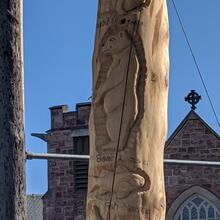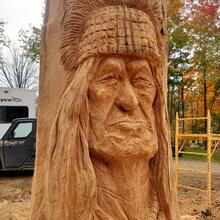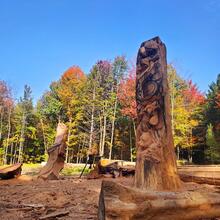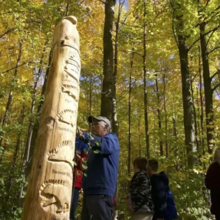
Totem Pole Locations
Totem poles have long been more than mere art; they are the silent storytellers of the Abenaki Nation of Missisquoi. Intricately carved by Chief Richard Menard, these towering figures capture our legends, traditions, and aspirations.
We invite you to experience these totem poles firsthand, set against the natural beauty of Swanton, Vermont, as well as a special totem pole located at Shelburne Farms in Shelburne, Vermont. You can visit and see it for yourself up the hill behind the Farm Barn.

Abenaki Totem: A Guide
There are so many striking features to our working landscape that you can be forgiven for having overlooked this one. But no more. The Abenaki totem and fire pit were gifted to the Farm in August 2015, when the Farm hosted the Wabanaki Confederacy Conference of the Western Abenaki people. It was carved by Missisquoi artist Richard Menard.
The Eagle
The Eagle symbol sits atop all of creation. Eagles are sacred spiritual beings that give Native people a direct connection to the creator. The Eagle guards our Eastern Gate and carries our prayers to the heavens. The Abenaki name for Eagle is Megeso.
The Bear
The Bear symbolizes medicine, power, protection, and the Abenaki Bear Clan (interior woodland tribes). The Bear stands at the Western Gate and provides our people with medicines. The majority of the People of the Pines are represented by the Bear. The Abenaki name for Bear is Awasos.
The Otter
The Otter symbol reminds us to be playful and not be tricked into situations that would destroy the unity of the people. We should always be mindful of the otter in working with other governments. The Abenaki name for Otter is Wnekikw.
The Turtle
The Turtle symbolizes Mother Earth, Turtle Island, and the Abenaki Turtle Clan, which includes those Abenaki Tribes living predominately along the Lake Champlain Basin. The Abenaki name for the Turtle is Tolba.
The Pine Tree
The Pine Tree symbolizes the tree of life and the “People of the Pines.” There are many spellings in the Abenaki language for this, including Kowa, Coosuk, Cowasuck, and Koasek.
The Wabanaki Confederacy sign
The Wabanaki Confederacy sign is a symbol of unity between the “People of the First Light”. These nations are the Mi’kmaq, Passamaquoddy, Penobscot, Wolastoqiyik, and Western Abenaki people.
May this totem always be a symbol of the historic conference event, our partnership with Shelburne Farms, and be used as an opportunity for people to learn about the Western Abenaki culture.

Abenaki Chief Don Stevens Shares a Story at a Fall Campfire
In addition to the totem, the Western Abenaki people built a fire pit during the conference. The white limestone rocks that encircle the sacred fire pit are a sign of purity and holiness.
They provided a place for our people to make offerings of tobacco and carry our prayers to the creator. These particular stones were the central spiritual center during the Wabanaki Confederacy Conference and contain the spiritual medicines of that event.
The sacred fire was protected by our firekeepers 24 hours a day throughout the Conference.
Afterward, I saved the ashes in containers, which I brought to the Wabanaki Confederacy meeting the following year. I gave a container to each of the tribes so the ashes could be included in their own fires in their homelands.
Some of the ashes were also included in “the bundle” (box) of sacred objects, which goes to the tribal nation hosting the Wabanaki Confederacy gathering each year to care for.



